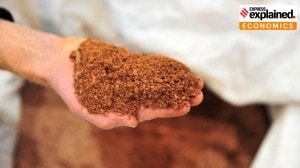`More like stables than human dwellings’
On November 5 he (C.F. Andrews) wrote to Tagore, `Fiji has just appeared over the horizon with its weird mountain shapes.' They immediatel...

On November 5 he (C.F. Andrews) wrote to Tagore, `Fiji has just appeared over the horizon with its weird mountain shapes.’ They immediately met the Governor, Eyre Hutson, and explained that their purpose was to check the validity of McNeill’s official report, which was not trusted by Indian opinion. The Governor was at once impressed by Andrews: `an exceptionally able man’. It was agreed that there would be no public meetings and no interviews with the press, and on this basis Hutson promised `full facilities’ to the visitors. He noted that both `kept the agreement with me faithfully.’
The two investigators went different ways, to cover as many estates as possible. Andrews spent much of the time at Suva, staying with the Bishop of Polynesia (for he still naturally gravitated to Anglican surroundings). He had several discussions with Hutson, who took `great pleasure’ in his `highly intelligent and broad mind, and of his modest unassuming manner, which are in such marked contrast to those of the usual type of men who have some humanitarian mission in life.’….
In his meeting with the Emigration Committee (which regulated the indenture system) Andrews was firm, but moderate. He made it clear that his goal was the abolition of indenture: `the evils are inherent in the system’. But he was prepared to discuss a transitional period between abolition and a new, free immigration. He disassociated himself from the leading Indian spokesman in Fiji, Manilal, whose behaviour Andrews thought `disgraceful’ because he said one thing for consumption outside Fiji and another of a conciliatory kind in contacts with the CSRC.
His main theme was the need to substitute kindly, reasonable treatment for arbitrary repression: `Then the Indian becomes extraordinarily willing, and then he will not feel a kind of incessant misery and discontent.’On December 7, Andrews faced an audience of the Planters’ Association; it was in private, to meet the Governor’s wishes. He made it clear that recruitment under the existing system could not continue.
In tones reminiscent of Victorian reformers he emphasised the inefficiency of present conditions, which were `industrially bad, because … the more money the Indian gets the more he will gamble and use in vice’. When they substituted free, family immigration, the planters would find their workers `the most law-abiding people in the world’. Two days later, he presented a report to the Governor. he dwelt upon the disintegration of the family and caste codes of conduct under indenture, and the demoralising atmosphere of the coolie lines.
They must attempt to reconstitute the solidarity of the Indian village community in Fiji. In forwarding the report, Hutson commented `There is much ignorance among officials in Fiji on the question of the proper treatment of Indians … There is much in the memorandum … that calls for consideration’….
…The return journey, and the first days at Santiniketan were mainly devoted to completing the report on Fiji. This was published on 19 February 1916, and at once made a big impact upon the public debate. The report placed great emphasis upon the moral degradation resulting from indenture, whereby the women were condemned to promiscuity, the men became brutes, and the coolie lines were `more like stables than human dwellings’. Indian culture was destroyed: `Everything that could be recognised as Hindu has departed.’ Yet despite the wrongs inflicted upon the Indian labourers, `Their patience and fortitude and simplicity won our continual regard.’
Excerpts from `The Ordeal of Love C.F. Andrews and India’, by Hugh Tinker, Oxford University Press, 1979





- 01
- 02
- 03
- 04
- 05









![Kadapa, [Andhra Pradesh], 27 May (ANI): Andhra Pradesh Chief Minister N Chandrababu Naidu and state Minister Nara Lokesh in conversation during the Telugu Desam Party's (TDP) annual three-day Mahanadu conclave, in Kadapa on Tuesday. (ANI Photo)](https://images.indianexpress.com/2025/05/tdp.jpg?w=300)
















